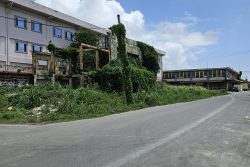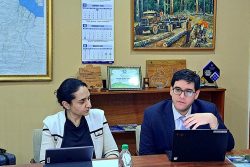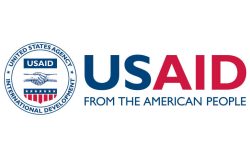Last Thursday the Guyana Football Federation (GFF) announced in a press release that the inaugural Diaspora Talent Identification Camp will be held from 26th to 28th July, at the Wiregrass Ranch Sports Campus in Orlando, Florida, USA. The main objective of the event is to unearth talented football players of Guyanese lineage in the 14 to 19 age group, who reside overseas, for the national youth training programmes.
According to the media statement, the camp will be hosted by the GFF and the Blackpool Sports Club of North America. The latter, which was founded in 1960 in the USA by former members of the St Sidwell’s Rovers, a former local youth team, is prominent in the promotion of football within the diaspora community. Last year, the two entities signed a three-year Memorandum of Understanding (MoU) “to pave the way for the creation of the GFF’s first International Player Scouting Network with a strategic focus on methodically pinpointing, enlisting, and nurturing young footballers.”
A tip of the hat to the GFF for attempting to elevate the standard of the game through widening the national talent pool by searching for players of Guyanese lineage. Under FIFA’s current rules a player is eligible to represent a territory if either of his/her biological parents or grandparents were born in that territory, criteria which was artfully maximised by Jack Charlton, the former English World Cup winner, who guided the Republic of Ireland to two World Cup Finals (1990 & 1994) during his stint as manager (1986 – 1996). It should be noted that the Lady Jaguars – our women’s national team – during their highly successful years – 2008 to 2011 – comprised mostly Canada-based players of Guyanese lineage.
However, there are pros and cons with this approach worthy of note. In the positive margin, there is the obvious chance of finding that rare and exceptional talent who can significantly improve the quality of the national team. Better yet, if the drafted players are professionals playing at a high level, that can serve as motivation for the local talent to lift their standard of play. Unfortunately, there are negative factors attached. Firstly, the cost factor involved in flying personnel back and forth, unless the GFF can secure an airline sponsorship deal to keep this factor to a minimum. Secondly, there is the wrangling with the professional player’s club, which might be reluctant to release the player for international matches and national training sessions.
Of course, there is the elephant in the room, the ‘Diaspora Factor’, where, quite often, expectations – on both sides – and reality are not aligned. Members of the diaspora, rather unfairly and without justification, tend to be viewed with a kaleidoscope of emotions by the local population. The gamut ranges from suspicion to skepticism to jealousy to fear, and more often than not, overlooks the significant role played by the diaspora in our development. For instance, the hundreds of millions of hard currency remitted annually by the diaspora to our national coffers. On the other hand, or foot as in this instance, overseas-based players have been known not to set the proper example, as in their unflattering conduct whilst representing Guyana in the Dominican Republic a few years ago.
Can we get beyond these petty emotions and successfully integrate players from the diaspora into the national team? Jamaica, arguably the strongest side in the English-speaking Caribbean at present, has managed to perform the trick. In the last five Concacaf Gold Cup tournaments, Jamaica, with a blend of local talent and foreign-based players has reached the semi-finals on four occasions, and finished in the runner-up position twice, in 2015 and 2017. It goes without saying that the coaching factor will play a vital role here, with the assessing and blending of the team. Unfortunately, our National Coach Jamal Shabazz is not allowed entry into the USA (SN Editorial, Where is the Coach? 21 June, 2023) and one can only speculate as to who will be the chief talent evaluator at the camp.
This current GFF administration has a penchant for inking MoUs that eventually peter out. On 16th May, the GFF signed a two-year MoU with the Saudi Arabian Football Federation collaborating in 17 areas “designed to significantly bolster the football ecosystem in Guyana.” Previous MoUs signed by the GFF include; with Racing Club de Madrid (October, 2023), to elevate local youth football, with Machinery Corporation of Guyana (April 2021) for ten excavator operator training scholarships for both male and female footballers, and a six-year agreement with the Denmark Football Association (DFA) (October 2019), which was also part of the UEFA Assist Programme, and included coaching education, infrastructure development, competition management, professional football league development, and governance and administration.
Signing MoUs and posing for photo opportunities looks and sounds exciting in the media but do they actually add value to the local game? Racing Club de Madrid is a professional club in Spain, one that is in the sixth tier of that country’s system, but not much has happened so far. The DFA sponsored a women’s league which was never completed, and later, the competition was converted into a knockout tournament.
One hopes that despite the aforementioned possible pitfalls, this new three-year GFF endeavour will bear fruit and have a positive impact on the development of the local game. After all, nothing ventured, nothing gained.









